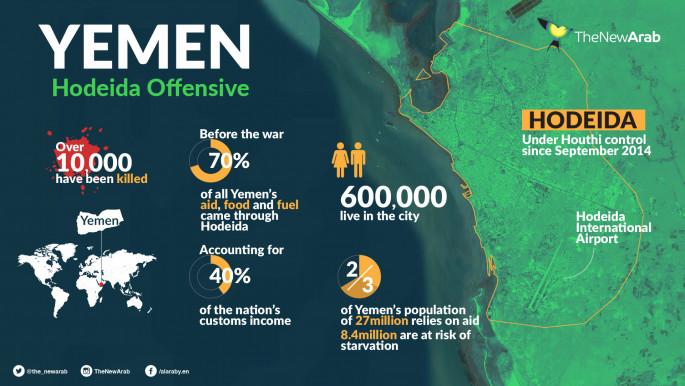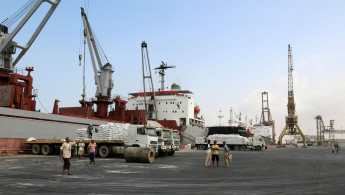Clashes flare near Yemen's flashpoint Hodeida amid concern for civilians
Yemeni pro-government forces traded mortar fire on Sunday with rebels near Hodeida airport, military sources said, on the fifth day of an offensive to seize back control of the strategic port city.
More than 70 percent of Yemeni imports pass through the docks of Hodeida port, controlled by the country's Houthi rebels.
The fighting between the Iran-backed rebels and a pro-government alliance has raised UN fears of humanitarian catastrophe in a country already teetering on the brink of famine.
Yemen's military forces have closed in on areas south and west of Hodeida port, sources in the army said.
Yemen's army on Saturday claimed it had seized the defunct Hodeida airport, held by the Shia rebels since 2014.
The Houthis, however, denied the news in a statement on their Saba news agency on Sunday.
Yemen's government and its allies launched the offensive on Hodeida on Wednesday. At least 139 combatants have been killed, according to medical and military sources.
The Houthi rebels drove Yemen's out of the capital, Sanaa, in 2014, pushing President Abedrabbo Mansour Hadi into exile and sparking an intervention by Saudi Arabia and its allies the following year.
The Arab-led coalition earlier this year imposed a near-total blockade on Hodeida port on allegations it served as a major conduit for arms smuggling to the rebels by Riyadh's regional arch rival Iran.
The capture of Hodeida would be the coalition's biggest victory of the war so far.
Rebel leader Abdel-Malik al-Houthi has urged his forces to put up fierce resistance and turn the region into a "quagmire" for the Arab-led coalition troops.
The Yemen war has claimed some 10,000 lives since the coalition intervened in 2015.
More than 22 million Yemenis are in need of aid, including 8.4 million who are at risk of starvation, according to the UN, which has described the conflict as the world's worst humanitarian crisis.





 Follow the Middle East's top stories in English at The New Arab on Google News
Follow the Middle East's top stories in English at The New Arab on Google News
![The UAE is widely suspected of arming the RSF militia [Getty]](/sites/default/files/styles/image_330x185/public/2024-11/GettyImages-472529908.jpg?h=69f2b9d0&itok=Yauw3YTG)
![Netanyahu furiously denounced the ICC [Getty]](/sites/default/files/styles/image_330x185/public/2024-11/GettyImages-2169352575.jpg?h=199d8c1f&itok=-vRiruf5)
![Both Hamas and the Palestinian Authority welcomed the ICC arrest warrants [Getty]](/sites/default/files/styles/image_330x185/public/2024-11/GettyImages-2178351173.jpg?h=199d8c1f&itok=TV858iVg)